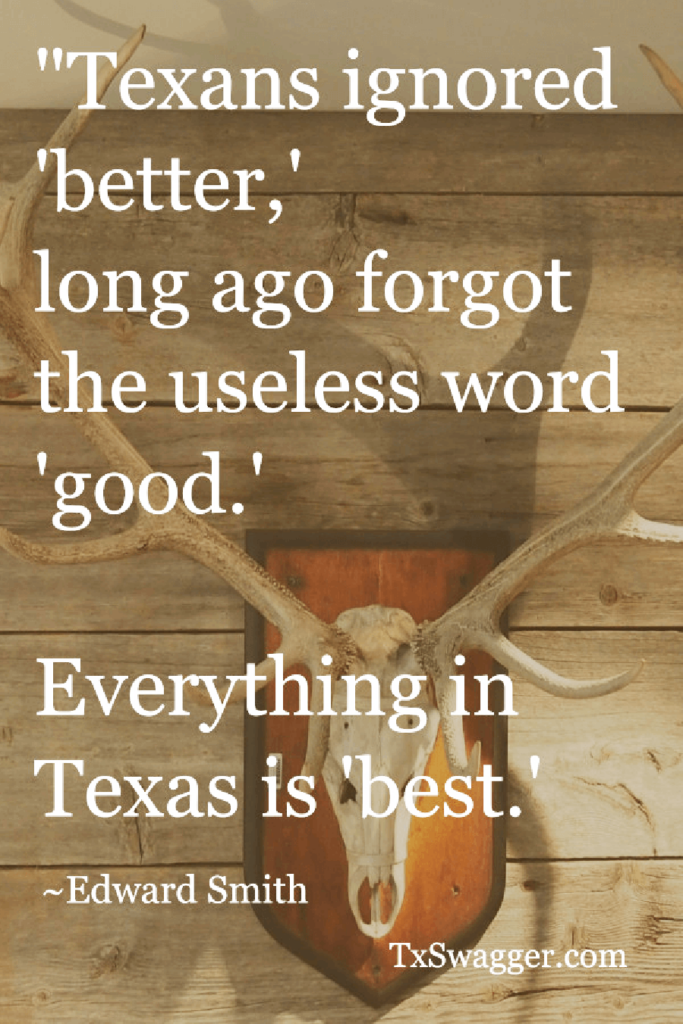Texas is big enough to be its own country. In fact, our land area is larger than 155 whole countries. So, is it any wonder we have our own culture, several sub-cultures, and in the case of this month’s feature… our own language?
While diversity is more of a thing these days, and some of these Texas-isms are more stereotype, or antiquated, than standard, they are still a part of Texas style. You may not run across any pardners gittin’ along their little dogies any more, but if you really want to feel Texan, there’s just some things y’all ought’a know how to say properly, or at least translate.
First and foremost, a visitor or new Texan must understand the complexity of addressing others. A single person may be addressed as Hoss, or Darlin’. However, be they from Bexar (BAY-er), Boerne (BURN-ee), or Manor (MAY-ner), y’all (proper contraction of you all) is used when addressing more than one person. It’s also more polite than calling a mixed group “you guys.” Naturally, if the group gets large enough, you must emphasize the quantity with an All Y’all. Of course, y’all’d’ve known that if you were born here.
It is also reasonable, when you are formally introduced to someone you are somewhat acquainted with, to say, “We howdied, but we ain’t shook.” Perhaps you ain’t met this person before because they live yonder, so far out in the country, the sun sets between their house and town.
If your new friend is a particularly boastful type, you may consider him all hat and no cattle. If he’s not the intellectual type, perhaps he couldn’t pour [urine] out of a boot with a hole in the toe and directions on the heel.
Since daylight’s burnin’ (don’t waste any time), you reckon you’d like to get to know him right quick (immediately), before you are near about past going (too tired), so you explain you are fixin’tuh (about to) get some lunch and you have a hankerin’ (craving) for barbecue. It is also important to explain that fixins’ are also what you eat with your barbecue (white bread, sliced white onions, dill pickle slices, sauce, and sometimes cheddar cheese squares on the side).
So you say, “Jeetjet?…no?… then les’squeat.” He may respond that he might could (has an affinity to) enjoy for some barbecue himself, and will ask what kinda coke (all soft drinks) you want with your supper, particularly if it’s summer and you’d have to set yourself on fire to cool off. If you’re lucky, he’s got more than he can say grace over (wealthy) so he can pick up the tab. If you like and enjoy the barbecue, then it was good as all git-out (the extreme case) and you can plan to meet again sometime to paint the town and the front porch (celebrate then come home to relax and talk about it). So, you ask “Y’aunt’to?”
GEN’L PURPOSE
It is helpful to drop the -Gs at the end of your verbs if you don’t want to sound city-fied. To make up for it, be sure to add the -Ns in your descriptive clauses so a Texan won’t be thinkin’ you’re dumber’n a box a’hammers.
Like many Southerners, Texans are big on blessing your heart. But, it is wise to consider the context, as the friendly phrase can mean anything from “Thank you,” to “Aww, your life really stinks” or “You’re a moron.” It is also worth noting, if a sentence starts with “Bless her heart, but…” the rest may be wildly insulting; “…she makes a hornet look cuddly.”
Other examples of Lone Star speak are evident in the pronunciation of words. You can tell a Texan by the way they emphasize the first syllable in words like CE-ment, PO-lice, and DIS-play.
Also helpful, for nearly every situation, is the universal You Good(?). Translated, this means: Are you okay? You are okay. How have you been? You’re welcome. No need to apologize. Need some money? Did you get enough? I’m very impressed with what you just did.

ADVICE FOR LIVING HERE
- Don’t dig up more snakes than you can kill.
- If you cut your own firewood, it warms you twice.
- Don’t cut your foot. (Watch out for cow pies.)
- Can’t dance, never could sing, and it’s too wet to plow. (Might as well do it.)
- Don’t go out in a toad choker / frog strangler. In other parts of the country, it rains cats and dogs. ‘Roun’ here, rivers flood with little warning, so a big rain is cause for caution.
- Always show loyalty with at least a Lord willin’, and the creek don’t rise, (I’ll do my best) and its more serious cousin, Come hell, or high water (no matter what).
BETTER’N YOU
- FAST: He can blow out the lamp and jump into bed before it gets dark.
- HAPPY: If I felt any better, I’d drop my harp plumb through the cloud.
- LUCKY: He’s riding a gravy train with biscuit wheels.
- TIRED: One wheel down and the axle dragging.
- HOT: Hens are laying hard-boiled eggs.
- BIG: When do we get to the ranch? Get there?… we’ve been on it for two hours.
